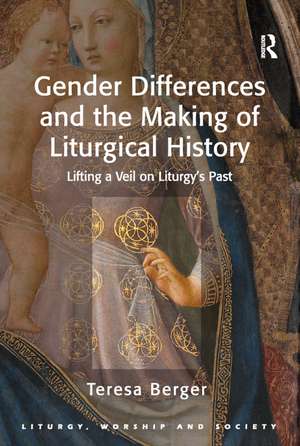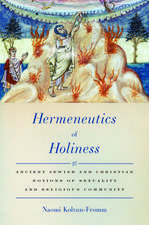Gender Differences and the Making of Liturgical History: Lifting a Veil on Liturgy's Past: Liturgy, Worship and Society Series
Autor Teresa Bergeren Limba Engleză Paperback – 28 iun 2011
| Toate formatele și edițiile | Preț | Express |
|---|---|---|
| Paperback (1) | 416.44 lei 43-57 zile | |
| Taylor & Francis – 28 iun 2011 | 416.44 lei 43-57 zile | |
| Hardback (1) | 1082.80 lei 43-57 zile | |
| Taylor & Francis – 28 iun 2011 | 1082.80 lei 43-57 zile |
Din seria Liturgy, Worship and Society Series
-
 Preț: 356.16 lei
Preț: 356.16 lei -
 Preț: 349.40 lei
Preț: 349.40 lei -
 Preț: 369.73 lei
Preț: 369.73 lei - 17%
 Preț: 256.48 lei
Preț: 256.48 lei -
 Preț: 457.14 lei
Preț: 457.14 lei -
 Preț: 382.36 lei
Preț: 382.36 lei -
 Preț: 389.66 lei
Preț: 389.66 lei -
 Preț: 380.84 lei
Preț: 380.84 lei -
 Preț: 469.34 lei
Preț: 469.34 lei -
 Preț: 377.45 lei
Preț: 377.45 lei -
 Preț: 489.26 lei
Preț: 489.26 lei -
 Preț: 416.22 lei
Preț: 416.22 lei -
 Preț: 469.34 lei
Preț: 469.34 lei -
 Preț: 384.48 lei
Preț: 384.48 lei -
 Preț: 469.34 lei
Preț: 469.34 lei -
 Preț: 395.04 lei
Preț: 395.04 lei - 17%
 Preț: 255.84 lei
Preț: 255.84 lei -
 Preț: 392.28 lei
Preț: 392.28 lei -
 Preț: 389.38 lei
Preț: 389.38 lei -
 Preț: 386.57 lei
Preț: 386.57 lei
Preț: 416.44 lei
Nou
Puncte Express: 625
Preț estimativ în valută:
79.69€ • 83.41$ • 66.32£
79.69€ • 83.41$ • 66.32£
Carte tipărită la comandă
Livrare economică 31 martie-14 aprilie
Preluare comenzi: 021 569.72.76
Specificații
ISBN-13: 9781409426981
ISBN-10: 140942698X
Pagini: 240
Ilustrații: black & white illustrations
Dimensiuni: 156 x 234 x 13 mm
Greutate: 0.46 kg
Ediția:New ed
Editura: Taylor & Francis
Colecția Routledge
Seria Liturgy, Worship and Society Series
Locul publicării:Oxford, United Kingdom
ISBN-10: 140942698X
Pagini: 240
Ilustrații: black & white illustrations
Dimensiuni: 156 x 234 x 13 mm
Greutate: 0.46 kg
Ediția:New ed
Editura: Taylor & Francis
Colecția Routledge
Seria Liturgy, Worship and Society Series
Locul publicării:Oxford, United Kingdom
Cuprins
Contents: Preface; Part I Gendering Liturgy's Past: the Trouble, the Task and the Tools: Gender history in liturgy's past - why not?; From women to gender differences in liturgy's past. Part II Tracing Gender in Liturgy's Past: Sacred spaces and gendered bodies; Eucharistic fragments: gender on and under the table of tradition; Presence at worship: bodily flows as liturgical impediments; Liturgical leadership: gender-troubled. Part III Gender, History, and Liturgical Tradition: The lasting presence of liturgy's past; Bibliography; Indexes.
Notă biografică
Teresa Berger is Professor of Liturgical Studies at Yale University's Institute of Sacred Music and Yale Divinity School. She holds doctorates in both liturgical studies and in systematic theology; her scholarly interests lie at the intersection of those fields with gender history. Teresa Berger has written extensively on liturgy and gender in the past. Her previous publications include Women's Ways of Worship (1999); Dissident Daughters: Feminist Liturgies in Global Context (2001); Fragments of Real Presence (2005); and a video documentary called Worship in Women's Hands (2007). She has also published monographs on the hymns of Charles Wesley and on the nineteenth-century Anglo-Catholic revival, and co-edited, most recently, the volume The Spirit in Worship-Worship in the Spirit (2009). Professor Berger joined the Yale faculty in 2007, after teaching at Duke Divinity School. She has been a visiting professor at the Universities of Mainz, Münster, Berlin, and Uppsala. An active Roman Catholic, she received the distinguished Herbert Haag Prize for Freedom in the Church in 2003.
Recenzii
'In this challenging and convincing new study, Teresa Berger uses the lens of gender analysis to take a fresh look at the writing of liturgical history. With scholarly insight, she demonstrates how gender has shaped liturgy’s past and continues to influence its celebration today. An indispensable resource for students of Christian worship and gender studies alike.' Simon Jones, Merton College, Oxford, UK 'In this excellent study Teresa Berger offers a challenging and intriguing correction to the ways in which the study of liturgical history has ignored the reality of gender differences in the shaping of, and the being shaped by, Christian liturgies past and present. From the gendered limitations of sacred spaces, to ignored Eucharistic imagery, to the sacramental impediments of bodily flows, and to gendered-troubled leadership, Berger "lifts the veil" and allows us to see with new eyes and new appreciation what was there all the time in the tradition - a renewed appreciation for the saints. What a great text this will be to use in courses in liturgical history.' Maxwell Johnson, University of Notre Dame, USA 'The author [...] gives a broad and deep analysis of the way gender influenced liturgical practice in the first centuries of Christianity... makes the important step of addressing how the past affects the present, noting contemporary issues, questions and developments.' Magistra ’Berger has presented a convincing case for re-reading our familiar sources with the veil of gender removed...’ Church Times 'This review can only be an incomplete reflection of a rich and panoramic history... the case histories are compelling and every page is rich in footnote references. The bibliography is extensive. It is a work to be studied at leisure, leaving the reader with an enhanced awareness and a responsibility to pursue future developments.' Women, Word, Spirit 'In lifting a veil on a largely overlooked aspect of the past, Berger shows how gender continues to
Descriere
Mapping uncharted territory in the study of liturgy's past, this book offers a history to contemporary questions around gender and liturgical life. Berger looks at liturgy's past through the lens of gender history, understood as attending not only to the historically prominent binary of "men" and "women" but to all gender identities, including inter-sexed persons, ascetic virgins, eunuchs, and priestly men. Drawing on historical case studies, Berger explores traditional fundamentals such as liturgical space and eucharistic practice and new ways of studying the past.















